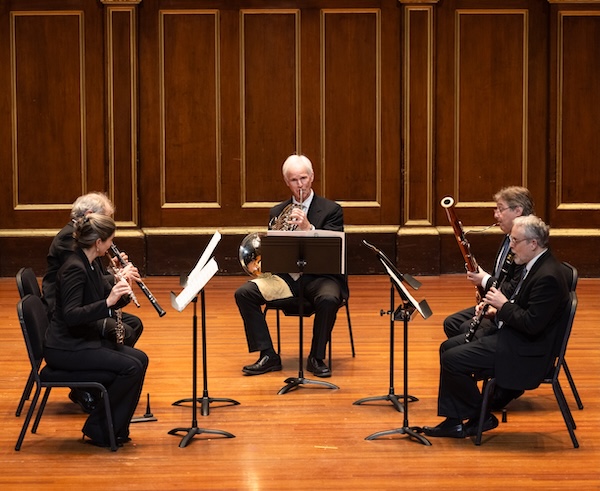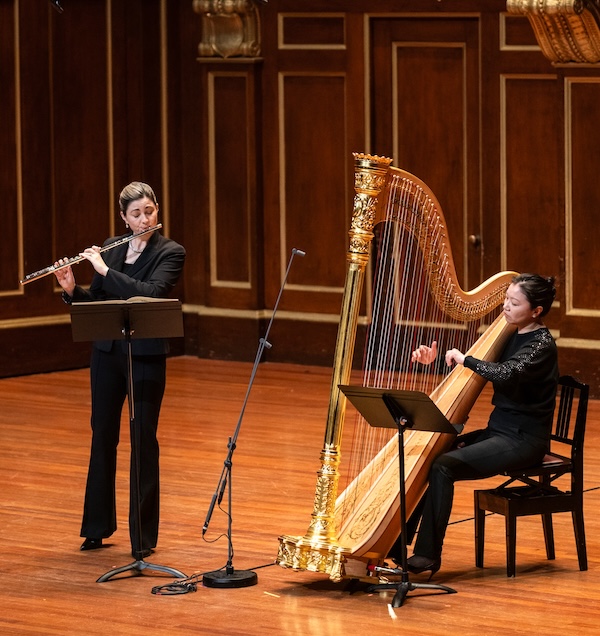Boston Symphony Chamber Players explore rarities from Andriessen to Thorvaldsdottir

The. Boston Symphony Chamber Players performed Carl Nielsen’s Wind Quintet Sunday afternoon at Jordan Hall. Photo: Robert Torres
What’s in a name? Up until now, the Boston Symphony Orchestra’s “Music of the Midnight Sun” festival limited itself, expectedly, to music from Scandinavia. But on Sunday, the Boston Symphony Chamber Players closed the two-week-long fête with a program that veered south and west.
Then, again, music is hardly limited by borders, so perhaps it’s not asking too much to stretch Nordic boundaries to include Austria and Holland—at least for an afternoon.
Either way, the Chamber Players and an engaged audience at Jordan Hall didn’t seem to mind the discrepancy. In fact, the latter was especially responsive to Sunday’s lineup of works by Carl Nielsen, Hendrik Andriessen, Anna Thorvaldsdottir, and Franz Schubert.
One should have expected as much, given the zesty rendition of Nielsen’s Wind Quintet that kicked off the event. Written in 1922, this is music that overflows with personality, as much in the interplay of voices during its rambling, conversational Allegro as in the knowing, idiomatic solos and exchanges that dot the concluding set of eleven variations.
Led by bassoonist Richard Svoboda’s drolly on-point delivery, Sunday’s performance leaned into the music’s genial charms, as well as its peculiar textures and turns of phrase. The central Menuet’s “game of pairs” unfurled with conspicuous elan and, once the dissonant Praeludium was out of the way, so did the theme and variations.
The last, which takes a lovely Nielsen chorale tune as its subject, provides all five instruments moments to shine. Sunday’s ensemble did just that, corporately—the fourth variation’s rhythms were crisp and snappy, while the fifth’s tipsy exchanges bubbled raucously—and individually.
More of the same followed in the afternoon’s other big offering, the American premiere of Hans Abrahamsen’s arrangement of four movements from Schubert’s Moments musicaux for winds and strings. Scored for an ensemble that mirrors that of the same composer’s Octet, it’s a colorful and idiomatic reworking of the familiar keyboard works.
That said, this set is a bit unvaried and ponderous: there is only one fast movement among the four and the imbalance is frustratingly perceptible.
Regardless, Sunday’s performance was warm and discreet. The players ably navigated the duel between strings and winds in the opening Moderato and infused the Andantino’s lapping rhythms with enchanting shape. The finale’s Trio was richly balanced while the Allegro moderato danced cheekily.
Thorvaldsdottir’s Spectra danced, too, though after a very different manner. A set of six short, connected movements written in 2017, this is a work that channels devices old and new: canons, drones, extended techniques, unpitched sonic gestures, and more. The effort is at once haunting and strangely comforting, like watching shapes emerge and recede during a blizzard.
Sunday’s absorbing performance held the house rapt. Technical execution was brilliant throughout, as violinist Alexander Velinzon, violist Cathy Basrak, and cellist Mickey Katz dispatched the notes with gripping surety. Even more striking were the eerie psychological depths the ensemble mined: Spectra is music that sounds indestructibly tangible even at its wispiest and most fragile.

Elizabeth Rowe and Jessica Zhou performed Louis Andriessen’s Intermezzo for flute and harp on Sunday. Photo: Robert Torres
Filling out the afternoon was Andriessen’s Intermezzo for flute and harp. Written in 1950, the score is just five minutes long but packed with notes. As such, it made a fitting sendoff for Elizabeth Rowe, who steps down from her position as the BSO’s principal flute in August.
Intermezzo showcased just why she is such a fine musician, offering no shortage of opportunities to demonstrate radiant tone and precise fingerwork, not to mention a preternatural sense of phrasing, color, and shape. What’s more, Rowe often brings, as she did Sunday, a palpable sense of discovery to new and unfamiliar fare.
Of course, other players in the orchestra possess similar qualities, including Jessica Zhou, who discharged the harp writing in Intermezzo with ringing fluency. Still, Rowe’s twenty years in Boston have been something very special and this performance was a reminder that her departure will be keenly felt.
The Boston Symphony Chamber Players and pianist Garrick Ohlsson play works by Bach and Messiaen at 3 p.m. March 31 at Jordan Hall. bso.org
Posted in Performances



